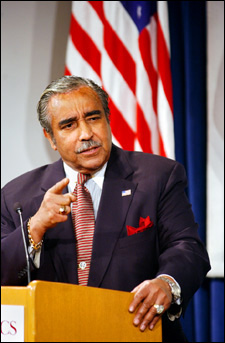Rangel argues for military draft at Kennedy School appearance:
Congressman says Americans “must think seriously” about “who will be doing the fighting and who will be doing the dying”

Taking aim at a phenomenon he has termed “patriotism lite,” Congressman Charles Rangel (D-NY) told an audience at the Kennedy School Forum on Monday night (Feb. 10) that Americans “must think seriously” about “who will be doing the fighting and who will be doing the dying” if the United States goes to war in Iraq. “I don’t think we want to believe that this is the kind of country where we take those who need the money to fight the wars, and others don’t have any sacrifices to make,” he said.
Rangel, who is a decorated Korean War veteran, has co-authored a bill in Congress calling for reinstatement of the military draft for Americans ages 18 to 26. His rationale for the legislation, he said, is to instill a sense of common sacrifice into a generation of young people who, because of the all-volunteer military, have not been called upon to serve their country.
“The question of war has to be understood, if not personally, then by at least references historically to sacrifice,” he said. “All of us have to feel a sense of responsibility and the question should be asked what can we do for our country?”
At the same time, Rangel explained, the current system has resulted in a higher percentage of blacks and other minorities in military service. “Am I raising the class issue? You bet your life I am. Am I saying that the affluent and those that are hooked up politically are excluded from serving? You bet your life. When the incentives are to pay people to join the military, people who don’t find better opportunities join the military,” he said.
Rangel also reiterated his opposition to the Bush administration’s position on Iraq, pointing out that pro-war factions sometimes miss the point. “I often speak with supporters of the war and I ask them the question: Would your enthusiasm about this pre-emptive strike against Iraq be the same if it was your kid that was being placed in harm’s way, or if it was your grandchild that you’re talking about?”
As for the dangers posed by Saddam Hussein, Rangel admits that the Iraqi leader is a “menace” and cannot be trusted, but, as he asked the audience, “If it is indeed an international problem, doesn’t it deserve an international solution?” Rangel also argued that it is Congress’ prerogative, not the president’s, to declare war and that “this country should demand more before we will go to war.”




